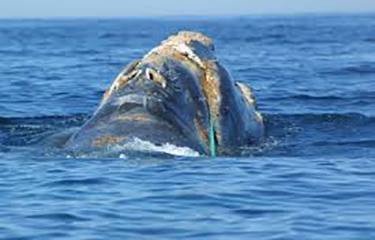Six different North Atlantic right whales were spotted dead in Canadian waters in June, five of which were discovered in the past week.
The North Atlantic right whale is one of the most endangered species on the planet, with just over 400 remaining in the wild. Interactions between right whales and fishing gear has led to multiple proposals to restrict gear used in fishing for lobsters and crabs, including a NOAA proposal to reduce lobstering gear in the Gulf of Maine.
Among the whales found dead was a mature female named Punctuation, who had given birth to at least eight known calves in the past and had been a grandmother to at least two grand-calves. In total, of the six whales found dead, four were female.
“The loss of sexually mature females is biologically a major loss to this species that has seen a precipitous population decline over the past several years,” the New England Aquarium said in a statement, according to a story in the New York Times.
The whales had seemed to be on a positive swing as seven whale calves had been spotted so far in 2019, a positive sign for the species. However, the string of deaths has scientists concerned about how ship traffic and fishing gear can be managed to help the species.
“Panicking seems appropriate, yes,” Peter Corkeron, who leads the large whale research program at NOAA’s Northeast Fisheries Science Center, told WGBH.
According to Corkeron, the whales seem to be occupying a wider area in the Gulf of St. Lawrence than they did in the past, putting the whales in the path of ships.
“From the whales' point of view, it's all the same place. It's like going to one coffee shop rather than another,” Corkeron said. “But, for how we manage killing them, it becomes really important.”
Earlier this year, the U.S. House approved the SAVE Right Whales act, introduced by U.S. Rep. Seth Moulton, to provide additional funding to research methods of rebuilding the population of the whales.
Saving the current whales, particularly the breeding-age females, will be essential to the species survival, Corkeron said.
“Losing an adult female and a female who is about to reach adulthood is a huge problem, because now they're not going to have any more babies,” Corkeron explained to WGBH. “If babies aren't born, then the rest of the species is just dead whales swimming.”
Photo courtesy of NOAA







